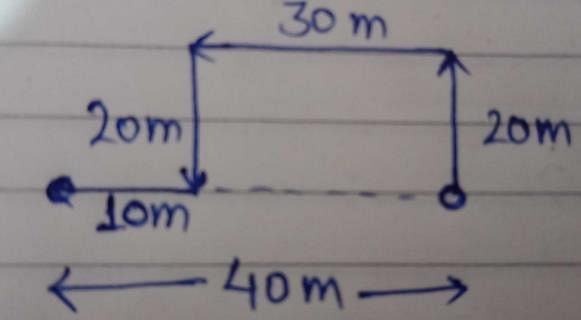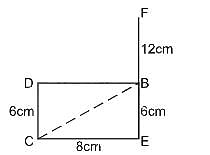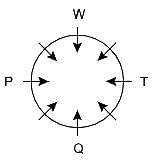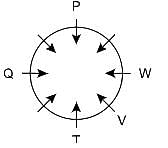WB Police Constable Mock Test - 10 - WB Police Constable MCQ
30 Questions MCQ Test - WB Police Constable Mock Test - 10
Direction: Read the following passages carefully and answer the question that follows.
Knowledge means knowing the things in an appropriate and better way. A man of knowledge can understand the circumstances more wisely, so can decide the things favorably. Knowledge inspired. confidence and courage to act at a right time. A man of knowledge possesses immense influence in society. He has the capacity to lead the society, mold the society in a positive direction and keeps away the society from the many social evils. A man of knowledge can turn the sleeping people into a thundering force. Whatever the inventions and discoveries are seen today. from needle to the jet planes. are the result of proper use of knowledge. Human being is the only creature who can use his brain wisely, rationally, selectively and can do wonders.
Q. What sort of life a man of knowledge can lead?
Knowledge means knowing the things in an appropriate and better way. A man of knowledge can understand the circumstances more wisely, so can decide the things favorably. Knowledge inspired. confidence and courage to act at a right time. A man of knowledge possesses immense influence in society. He has the capacity to lead the society, mold the society in a positive direction and keeps away the society from the many social evils. A man of knowledge can turn the sleeping people into a thundering force. Whatever the inventions and discoveries are seen today. from needle to the jet planes. are the result of proper use of knowledge. Human being is the only creature who can use his brain wisely, rationally, selectively and can do wonders.
Direction: Read the following passage carefully and answer the questions. Your answer to these questions should be based on passage only.
Mandela recollects that it was almost impossible for a black man in south Africa to fulfill his obligation to his family and society because of the system of apartheid practiced by the white rulers. He began to hanker after freedom when he realized that his freedom had been taken away from him when he reached manhood. He yearned for the basic and honorable freedoms of achieving his potential, of marrying, having a family-the freedom not to be obstructed in a lawful life. When Mandela realized that not only his freedom was curtailed, but the freedom of everyone who looked like him was also curtailed. That's when he joined the African national Congress and that is when the hunger for his own freedom became the greater hunger for the freedom of his people.
Q. What was the realization of Mandela?
Mandela recollects that it was almost impossible for a black man in south Africa to fulfill his obligation to his family and society because of the system of apartheid practiced by the white rulers. He began to hanker after freedom when he realized that his freedom had been taken away from him when he reached manhood. He yearned for the basic and honorable freedoms of achieving his potential, of marrying, having a family-the freedom not to be obstructed in a lawful life. When Mandela realized that not only his freedom was curtailed, but the freedom of everyone who looked like him was also curtailed. That's when he joined the African national Congress and that is when the hunger for his own freedom became the greater hunger for the freedom of his people.
| 1 Crore+ students have signed up on EduRev. Have you? Download the App |
Direction: While the modern India has made progress in various fields, the priceless intangible heritage of works like the Sama Veda have gone unnoticed-a great loss indeed. We have, it could be said, mindlessly pursed a line of development causing
unwelcome changes to the very fabric of our culture; not very different from iconoclastic behavior. In spite of the fact that a large number of rich Indians possess more wealth than the world's richest, we demonstrate such ignorance about the Vedas in general and Sama Veda in particular. One needs to find out why the world’s oldest composite literature on religion, sciences, humanities and spirituality attracts little public attention today. The yajnas, apart from their religious functions, were unfortunately termed as mere ‘rituals’ even by Indian scholars and so their secular significance has been undermined. It has been shown in a premiere scientific institute in Pune that the Yajna bhasma being of the size of nano-particles had positive effects on human health and the environment.
Q. According to the passage "the iconoclastic behaviour" means ?
unwelcome changes to the very fabric of our culture; not very different from iconoclastic behavior. In spite of the fact that a large number of rich Indians possess more wealth than the world's richest, we demonstrate such ignorance about the Vedas in general and Sama Veda in particular. One needs to find out why the world’s oldest composite literature on religion, sciences, humanities and spirituality attracts little public attention today. The yajnas, apart from their religious functions, were unfortunately termed as mere ‘rituals’ even by Indian scholars and so their secular significance has been undermined. It has been shown in a premiere scientific institute in Pune that the Yajna bhasma being of the size of nano-particles had positive effects on human health and the environment.
Direction: Read the following passages carefully and answer the question that follows.
The harbor was abuzz. People were wandering here and there, screwing their eyes up to the horizon, checking to see if the ship had arrived. Not just any ship of course there were plenty of those to be seen on the waters, bobbing elegantly but this was the "Tuscany", from America. Nothing to boast of as far as the ship itself was concerned. Just the cargo she carried. Finally, a ship arrived, slowly, painstakingly, with two men, seen as little specks on the deck.
Q. 'Screwing their eyes upto the horizon' means?
Direction: Read the following passage carefully and answer the questions. Your answer to these questions should be based on passage only.
Shouldn't we then live in harmony with nature and evolve with it? Our brains, too, are wired to enjoy the beauty of nature. No man-made systems can complete with the joy and well-being. we feel in observing nature's display all year round. We recover rapidly from physical stress when exposed to pleasing natural environmental beauty. We take holidays amidst natural scenic wonders and we retreat to nature to recover and recoup from stress. Yet, we choose to destroy nature with our wasteful lifestyles and our burgeoning population. We use natural resources inefficiently and destroy them for technological development. We think we can change the natural resources inefficiently and destroy them for technological development. We think we can change the natural tapestry, and have even started playing God !
Q. How can we live in harmony with nature?
Direction: Read the following passages carefully and answer the question that follows.
Knowledge means knowing the things in an appropriate and better way. A man of knowledge can understand the circumstances more wisely, so can decide the things favorably. Knowledge inspired. confidence and courage to act at a right time. A man of knowledge possesses immense influence in society. He has the capacity to lead the society, mold the society in a positive direction and keeps away the society from the many social evils. A man of knowledge can turn the sleeping people into a thundering force. Whatever the inventions and discoveries are seen today. from needle to the jet planes. are the result of proper use of knowledge. Human being is the only creature who can use his brain wisely, rationally, selectively and can do wonders.
Q. What is the reformative activity of a man of knowledge according to the given passage?
Direction: Read the following passage carefully and answer the questions. Your answer to these questions should be based on passage only.
Mandela recollects that it was almost impossible for a black man in south Africa to fulfill his obligation to his family and society because of the system of apartheid practiced by the white rulers. He began to hanker after freedom when he realized that his freedom had been taken away from him when he reached manhood. He yearned for the basic and honorable freedoms of achieving his potential, of marrying, having a family-the freedom not to be obstructed in a lawful life. When Mandela realized that not only his freedom was curtailed, but the freedom of everyone who looked like him was also curtailed. That's when he joined the African national Congress and that is when the hunger for his own freedom became the greater hunger for the freedom of his people.
Q. Whose concern does this passage voice?
Direction: While the modern India has made progress in various fields, the priceless intangible heritage of works like the Sama Veda have gone unnoticed-a great loss indeed. We have, it could be said, mindlessly pursed a line of development causing
unwelcome changes to the very fabric of our culture; not very different from iconoclastic behavior. In spite of the fact that a large number of rich Indians possess more wealth than the world's richest, we demonstrate such ignorance about the Vedas in general and Sama Veda in particular. One needs to find out why the world’s oldest composite literature on religion, sciences, humanities and spirituality attracts little public attention today. The yajnas, apart from their religious functions, were unfortunately termed as mere ‘rituals’ even by Indian scholars and so their secular significance has been undermined. It has been shown in a premiere scientific institute in Pune that the Yajna bhasma being of the size of nano-particles had positive effects on human health and the environment.
Q. Which of the following is having positive effects on human body ?
Direction: Read the following passages carefully and answer the question that follows.
The harbor was abuzz. People were wandering here and there, screwing their eyes up to the horizon, checking to see if the ship had arrived. Not just any ship of course there were plenty of those to be seen on the waters, bobbing elegantly but this was the "Tuscany", from America. Nothing to boast of as far as the ship itself was concerned. Just the cargo she carried. Finally, a ship arrived, slowly, painstakingly, with two men, seen as little specks on the deck.
People were wandering here and there explains ?
1. People were eagerly waiting for ship to arrive at the harbour
2. People were waiting for cargo carried by the ship.
Q. Which of the statement are true ? select the code given below .
Direction: Read the following passage carefully and answer the questions. Your answer to these questions should be based on passage only.
Shouldn't we then live in harmony with nature and evolve with it? Our brains, too, are wired to enjoy the beauty of nature. No man-made systems can complete with the joy and well-being. we feel in observing nature's display all year round. We recover rapidly from physical stress when exposed to pleasing natural environmental beauty. We take holidays amidst natural scenic wonders and we retreat to nature to recover and recoup from stress. Yet, we choose to destroy nature with our wasteful lifestyles and our burgeoning population. We use natural resources inefficiently and destroy them for technological development. We think we can change the natural resources inefficiently and destroy them for technological development. We think we can change the natural tapestry, and have even started playing God !
Q. What is the human weakness?
Directions to Solve
In each of the following questions, arrange the given words in a meaningful sequence and thus find the correct answer from alternatives.
Question -
Arrange the words given below in a meaningful sequence.
1. Presentation2. Recommendation3. Arrival4. Discussion5. Introduction
If two days before yesterday was Friday, what day will be day after tomorrow?
Ravi is 7 ranks ahead of Sumit in a class of 39. If Sumit's rank is seventeenth from the last, what is Ravi's rank from the start?
The train for Lucknow leaves every two and half hours from New Delhi railway station. An announcement was made at the station that the train for Lucknow had left 40 minutes ago and the next train will leave at 18.00 hrs. At what time was the announcement made?
Count 9 in the numbers sequence which is followed by 7 and preceded by either 4 or 5. How many 9 are there in the sequence?
1 2 3 7 8 9 1 4 9 7 3 6 9 8 1 5 3 5 9 7
Directions: Which of the following options will replace the question mark (?) in the figures given below?

In each of the following questions, select a figure from amongst the four alternatives, which when placed in the blank space of figure (X) would complete the pattern.
Identify the figure that completes the pattern.

In each of the following questions, select a figure from amongst the four alternatives, which when placed in the blank space of figure (X) would complete the pattern.
Identify the figure that completes the pattern.

In each of the following questions, select a figure from amongst the four alternatives, which when placed in the blank space of figure (X) would complete the pattern.
Identify the figure that completes the pattern.

Facing North, Ramesh walks 20 m, then he turns left and walks 30m, then again he turns left and walks 20 m. Then, he turns right and walks 10 m. How far is he now from his starting position?
Direction: Study the following information and answer the given questions carefully.
Point B is 12 cm south of point F. Point C is 8 cm west of point E which is 18 cm away in the south direction with respect to F. B is east of D which is 6 cm north of point C.
Q. In which direction is point D with respect to point E?
Rohan starts for morning walk towards west. He walks 1 km, then turns left and walks 600m, then turns left and walks 1.3km, again he turns right and walks 600m further. In which direction is he moving now?
Study the information and answer the questions given below:
On a playing ground, Dev, Kumar, Nilesh, Ankur and Pintu are starting as directed below facing the North.
i. Kumar is 40 m to the right of Ankur.
ii. Dev is 60 m to the South of Kumar.
iii. NIlesh is 25 m to the West of Ankur.
iv. Pintu is 90 m to the North of Dev.
Q.
If a boy walks from Nilesh, meets Ankur followed by Kumar, Dev and then Pintu, how many metres has he walked, if he has travelled the straight distance all through?
Seven persons B, C, D, E, F, G and H are born on seven different months of a year starting from January, but not necessarily in the same order. Who was born in July?
Statement I: C was born just before D. Only two persons are born after H. Three persons are born between H and B. F was born two months after B.
Statement II: E was born in April. D was born after C. Two persons are born between E and B. B was not born in July. C was born one of the months after May.
Eight friends- P, Q, R, S, T, U, V and W are sitting around a circular table but not necessarily in the same order. All of them are facing the center. Who is facing V?
Statement I: V is sitting to the immediate left of W. R is sitting 2nd to the left of S.
Statement II: Q is sitting 2nd to the left of T. T is facing P. The number of friends sitting between P and Q is same as the number of friends sitting between P and W.
Directions: Each of the following consists of a question and two statements numbered I and II given below it. You have to decide whether the data provided in the statements are sufficient to answer the question.
Among six persons – Rishi, Sanjay, Komal, Usha, Vijay and Tarak, each of different heights. Who is the tallest?
Statement I: Tarak is taller than only one person. Komal is taller than Rishi but shorter than Vijay.
Statement II: Rishi is taller than both Tarak and Sanjay. Vijay is not the tallest.
































